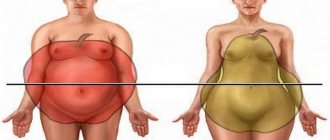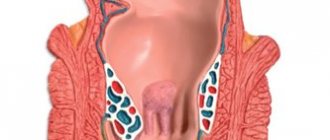Factors influencing the female figure
Sharp weight gain in women does not happen just like that; there are always reasons that contribute to a change in figure for the worse. There are many factors that give rise to a rapid gain of extra pounds: from poor nutrition to disruptions in the functioning of the body, this most often occurs in women after 30.
But the main reasons are the following:
- A sedentary lifestyle is the most common factor affecting a woman's figure. Many women spend most of their time sitting. Because of this, the body does not consume the calories received and simply stores them. Because of this, young girls accumulate extra pounds more slowly than women over 30. But they still accumulate.
- Poor nutrition. About 8 out of 10 people eat poorly. Not only do some people eat only 3 or even 2 times a day, they also eat junk food. And naturally this affects the figure.
- Hormonal imbalance, this happens most often after 30. With hormonal imbalance, an increase in body weight occurs, even with an active lifestyle and proper nutrition. Therefore, if unreasonable weight gain occurs, you should immediately contact a specialist. Since neither diets nor grueling workouts will help you get rid of extra pounds. And hormonal imbalance is a sign of disturbances in the functioning of the body.
- A malfunction of the thyroid gland always provokes a sharp increase in weight. The failure occurs in both young girls and women after 30. In addition to causeless weight gain, symptoms of thyroid dysfunction include deterioration in the appearance of nails, hair and skin, and a constant feeling of cold. If a woman has these symptoms, she should immediately contact an endocrinologist. Since disturbances in the functioning of the thyroid gland can lead to serious consequences.
- Accumulation of large amounts of fluid in the body. The human body consists of 80% liquid, and it is necessary for human life. However, sometimes it accumulates too much. Fluid accumulates in and between the cells, causing swelling and cellulite. Typically, swelling goes away quickly and does not affect the person’s condition. But if this happens too often, then you need to check your kidneys and heart.
- Medicines and antidepressants. Sudden weight gain often occurs due to taking various medications. Typically, rapid weight gain occurs with long-term use. And when you stop taking them, the weight quickly returns to normal. If medications need to be taken for several years, then you should find out about the possibility of replacing them with analogues that do not have such side effects.
- Psychological reasons. Constant stress and depression affect each person differently. Some people gain weight sharply under stress, while others, on the contrary, lose weight very quickly. A sharp increase in weight during stress is due to the fact that a person tries to suppress his emotions with food. And with depression, a person feels empty and looks for a way to fill this emptiness, and many use food to do this.
In addition to the above factors, there are many more reasons that contribute to sudden weight gain: quitting cigarettes, poor sleep, menopause, deficiency of vitamins and minerals necessary for the body.
There are also many more psychological reasons besides stress and depression: guilt, falling in love, apathy, etc.
It is important to remember that sudden sudden weight gain is most often a sign of a disorder or a symptom of a disease.
“Eat a lot” is the last reason you should think about.
pixabay.com
You probably know that you can gain a couple of kilograms if you regularly indulge in high-calorie foods or fast food, chips, and the like. But if you haven't changed your eating and exercise habits, and the number on the scale suddenly starts to rise, then something else is clearly going on.
Extra pounds are not necessarily and not always a problem, of course, but it can also signal serious problems in the body. The only way to be 100% sure what this means is to consult your doctor. For now, let's look at these 8 reasons that may explain why this could happen.
Reasons for weight gain at different ages
Rapid weight gain never occurs without reason, however, the reasons for women of different ages differ. There are many factors that contribute to the rapid change in weight, which depend on age:
- Weight gain is rapid after 20. In young girls, weight problems mainly arise from drinking alcoholic beverages and partying. Since at parties there is always harmful and high-calorie food, which is consumed in large quantities and at late times. Falling in love also affects a girl’s figure. Since people influence each other, and if someone in a couple often eats junk food, then the other one will also eat it.
- Weight gain after 30. Basically, problems with excess weight clearly appear after 30. This is primarily due to the birth of a child, which is accompanied by changes in the female body. Getting rid of extra pounds after pregnancy is very difficult. After giving birth, she also suffers from lack of sleep, which also negatively affects her figure. In addition to all this, rapid weight gain in a woman after 30 also occurs due to psychological reasons. Women over 30 are more likely to experience stress, depression, apathy, and fatigue.
- Weight gain after 40 and 50 years. After 40, a woman’s body undergoes serious changes that greatly affect her figure. At this age, every 2 women have problems with excess weight. This is due to a slower metabolism, taking various medications, illness, stress and depression.
A woman’s age greatly affects her figure, the condition of her skin, hair and nails. Therefore, when developing a training program and diet, you need to take this factor into account.
You have a disruption in the endocrine system
About one in five adults has a deficiency of thyroid hormones—hypothyroidism—according to the US National Institutes of Health. Although this condition is much more common in women, many men experience hypothyroidism, which can lead to sudden and significant weight gain.
But this is far from the only deviation that can cause weight gain. There are many such disorders, and as a rule they manifest themselves together with fatigue, irritability, depression and anxiety.
- Author: Marina Tikhomirova
How to get rid of excess weight, what to do with it?
Adviсe
- Stop using contraceptives!
There are other ways to protect yourself. Try them too!
For example, there are such tools:
- Contraceptive patch.
- Vaginal ring.
- Spiral.
- Condoms.
- Interruption of sexual intercourse.
- Temperature method.
- Calendar method.
- Candles.
- “Safe” types of intimate relationships.
- Do aerobics and fitness!
Follow the regime in these activities. If the trainer told you to come and lose weight three times a week, then don’t skip it, go. Strengthen your exercise regimen, rather than “fitness” at one level. Otherwise, there will be no effect that you are waiting for!
- Eat in the kitchen!
Look at the dishes and dishes, not the TV screen! You can find other times to watch movies and shows.
By the way, do not rush to lie down on the sofa after eating, as acting this way is harmful! Calories and weight will come to you faster! And it will be more difficult to get rid of “unwanted guests”.
- Eat less!
You can drink whenever you want to eat! Why not an option? - Quite convenient! Tea, coffee, juice, mineral water, ordinary water…. Drink something that doesn't contain sugar but is chock full of "naturalness." Beer (non-alcoholic) is excluded - definitely!
- Try to get pregnant!
Some women manage to lose weight after childbirth. Unless, of course, you are currently pregnant... This also needs to be checked. Make an appointment with a good gynecologist. He (this doctor) will definitely not be mistaken about the results. Or buy tests at the pharmacy. A few pieces to significantly add authenticity!
- Love the movement!
Because activity is not only life, but also “parting” with kilograms. If there is no way to move in any special way, walk and run! Are you sweating a lot? - Buy antiperspirant! It really helps to escape from such a problem.
- Sing, laugh, smile!
Such positivity mercilessly “robs” excess weight from women’s bodies. We bet you didn't know this? And now…. You will know! When you feel bad, remember this. Life will become more fun and easier! Happy testing, women!
A neighbor advised me to try a good, effective diet. I don't know what it's called, but I wrote down its menu!
Polycystic ovary syndrome
With an increase in the number of male sex hormones in women, increased hairiness is observed, as in men. In the absence of ovulation, infertility develops. Menstruation is irregular or absent altogether. This disease leads to excess body weight gain, since the functioning of the reproductive system is disrupted.
There are many reasons for obesity. Statistics say that 25% of cases of overweight are a consequence of the body being susceptible to illness. The remaining 75% is a consequence of lack of the required amount of exercise, poor nutrition and poor eating habits. The editors of TopCafe really hope that our article about some of the reasons why you can gain weight helped you learn something new.
Insulinoma
Insulinoma is a tumor consisting of β-cell fragments of the pancreas. It promotes the release of large portions of insulin into the blood. The result is a deficiency of sugar and an excess of insulin, which causes hypoglycemia. During attacks, a “ravenous appetite” appears, as well as other symptoms, such as:
- shiver;
- tachycardia;
- headache;
- cold sweat;
- hearing impairment;
- increased feeling of fear;
- vision problems;
- voice-related disorders;
- speech disorders;
- hallucinations.
Severe disease can manifest itself as convulsions and even the patient entering a comatose state.
7
Itsenko-Cushing syndrome - a provocateur of obesity
As soon as the correct functioning of the adrenal cortex is disrupted, the hormone cortisol immediately begins to be released. This leads to the appearance of extra pounds. The disease is determined upon examination of the patient. The main symptom of the syndrome is a sharp increase in excess weight.
An excess of the hormone cortisol in the body can provoke various metabolic disorders. This hormone promotes the breakdown of protein, which increases blood sugar levels. This contributes to a rapid decrease in muscle tissue, while increasing fat deposits. The main areas in which fat accumulates in this disease are the waist, hips, and chin. The arms and legs generally remain the same.
Itsenko-Cushing syndrome must be treated, since obesity is only the beginning of possible problems. The consequences of this disease include the development of cancer and, as a consequence, death.
2
Adiposogenital dystrophy
Disruption of the hypothalamic-pituitary system leads to the development of pituitary obesity. The causes of this pathology may be different. The main ones include: brain tumors, intrauterine infections, infectious diseases (meningitis, tuberculosis, encephalitis, syphilis), head injuries.
As a result of the disease, the secretion of certain hormones decreases, which leads to a delay in puberty. This also leads to gaining extra pounds. Delayed sexual development will lead to the accumulation of fat in the body. Adiposogenital dystrophy is a problem in childhood and adolescence, when the young body is in the puberty phase.
Parents must pay attention to how their child is gaining weight: is it normal weight for a certain age or is it overweight. If a child is gaining weight quickly, and there is no obvious reason for this, then a medical examination is necessary to find out the reasons for the excess weight.
5
Insufficient fluid
When we don't drink enough fluids, kidney function slows down and this allows toxins to build up in the body rather than being released. Experts recommend drinking at least two liters of water per day to stay hydrated, prevent fluid retention, and flush out waste from the body. You can drink natural juices or tea. However, drinking sugary soft drinks may contribute to weight gain because they have a high concentration of sugar and other compounds. Therefore, they should always be avoided.
This is useful to know:
Additional materials:
- Another reason why weight doesn’t come off is incorrect calculation of calories for weight loss.
- Anyone who wants to successfully lose weight needs to understand in detail the question: what is proper nutrition for weight loss.
- A baking soda bath, easily used at home, will be an excellent assistant in the process of losing weight.
Stress
Often, severe stress, such as the loss of a loved one, divorce or a relationship, causes weight loss. Sometimes weight loss occurs so rapidly that a person loses 3-4 kilograms per week. This is due to a number of reasons. First of all, a person experiencing stress literally forgets about food without feeling hungry.
When people get nervous, they begin to twitch, make a lot of meaningless movements, and become fussy, which also increases calorie consumption. There is evidence that nervousness itself increases energy expenditure. When stressed, the production of hormones responsible for metabolism increases. For example, in a state of fear, excitement or excitement, the body produces the hormone adrenaline, which speeds up metabolism. This leads to an acceleration of the heartbeat, an increase in the metabolic rate and, accordingly, the consumption of additional calories.
Of course, this does not mean that in order to lose weight you need to become worried and nervous. Prolonged negative emotions lead a person to a state of stress, which causes the accumulation of excess weight and the development of obesity. It's all about the hormone cortisol, secreted by the adrenal glands during stress - it promotes the deposition of fat, unfortunately, mainly in the abdominal area.
It is not necessary to go into depression; stress simply negatively affects metabolism, significantly slowing it down, forcing the body to store fat in reserve. If the root cause is too much stress, you will gain weight around your waist. If you can't cope with stress, you'll likely overeat on top of that.
It is one of the main reasons for this problem. Anxiety, depression and other emotional factors can slow your metabolism and cause weight gain.
During times of stress, people try to eat foods high in carbohydrates, which have a calming effect because they help produce serotonin, the “happiness hormone.”
Does your weight fluctuate seasonally?
In the autumn-winter period, the body of any person strives to gain weight, so the “golden season” begins for those who want to gain weight. On the contrary, people who decide to lose weight in the fall and winter will face additional difficulties in the form of the body’s natural desire to stock up on nutrients for the winter.
In the spring-summer season, everything happens the other way around - the body strives to remove all the excess that has accumulated during the difficult winter period. Therefore, it is easier for a person to get rid of toxins and extra pounds. On the other hand, it is difficult to gain muscle mass in spring and summer, so those who are gaining weight should not set grandiose goals for themselves.
Why does weight gain quickly during pregnancy? Causes
Why do you gain excess weight during pregnancy? The reasons may vary. Some of them stretch back from the period that preceded conception:
- incorrect eating habits (lack of a meal schedule, skipping breakfast, replacing lunch with dry and unhealthy snacks, overeating before bedtime);
- genetic predisposition to obesity;
- diseases of the endocrine system;
- metabolic disorders;
- excess weight before pregnancy;
- age after 35 years;
- physical inactivity;
- hypothyroidism
But there are also factors that begin to provoke weight gain directly during pregnancy:
- binge eating;
- accumulation of excess fluid (hydrops pregnancy);
- constipation;
- early toxicosis.
During pregnancy, the body begins hormonal changes in order to preserve the fetus and maintain all anabolic processes. Several chains are launched at once, leading to weight gain:
- increased production of progesterone, prolactin, estrogens → they stimulate lipogenesis → estrogens activate lipoprotein lipase, progesterone inhibits lipolysis → intense fat deposition on the buttocks and thighs;
- decreased sensitivity to insulin → increased its level in the blood → hypersynthesis of ghrelin (maximum concentration occurs at the end of the second trimester) → increased appetite → formation of visceral fat.
Many women perceive pregnancy as a pathological condition reminiscent of a disease: everyone takes care of them, protects them from unnecessary movements, recommends lying down and sleeping more, and not overexerting themselves. All this leads to physical inactivity, and fewer calories are burned. Overeating (we have already talked about how to cope with compulsive gluttony) combined with a lack of physical activity is the main cause of energy imbalance, due to which weight gets out of control.











